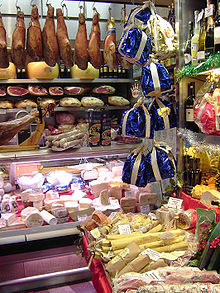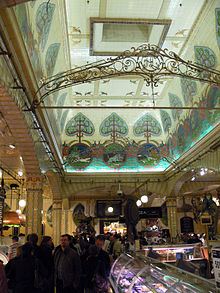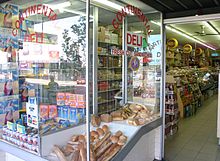Delicatessen: Difference between revisions
→United States: Added citation needed. The US section sounds like a bunch of anecdotes strung together. |
|||
| Line 32: | Line 32: | ||
==United States== |
==United States== |
||
{{Unreferenced section|date=April 2014}} |
|||
In the United States, a delicatessen store, or deli, is a type of business that could be described as a synthesis of a [[grocery store]] and a fast-food restaurant. The delicatessen store offers a wider and fresher menu than those found at [[List of fast-food restaurants|chain fast food restaurants]], rarely employing fry machines (except for chicken) and routinely preparing sandwiches to order. They may also serve hot foods kept on a steam table, like a cafeteria. They sell [[cold cut]]s by weight and prepare party trays. Delicatessen stores vary greatly in size but are typically not as large as grocery stores. In areas with high rents for retail space, delicatessen stores are often quite small. |
In the United States, a delicatessen store, or deli, is a type of business that could be described as a synthesis of a [[grocery store]] and a fast-food restaurant. The delicatessen store offers a wider and fresher menu than those found at [[List of fast-food restaurants|chain fast food restaurants]], rarely employing fry machines (except for chicken) and routinely preparing sandwiches to order. They may also serve hot foods kept on a steam table, like a cafeteria. They sell [[cold cut]]s by weight and prepare party trays. Delicatessen stores vary greatly in size but are typically not as large as grocery stores. In areas with high rents for retail space, delicatessen stores are often quite small. |
||
Revision as of 07:23, 29 April 2014

This article needs additional citations for verification. (March 2011) |
Delicatessen is a term meaning "delicacies" or "fine foods". In English, "delicatessen" originally meant only this specially prepared food. In time, the delicatessen store where this food was sold came to be called a delicatessen, and in this sense is often abbreviated to deli.[1]
Etymology

Delicatessen is a German loanword[2] that first appeared in English in 1889;[3] it is the plural form of Delikatesse. In German, it was originally a French loanword, délicatesse, meaning "delicious things (to eat)". The root word is the Latin adjective delicatus, meaning "giving pleasure, delightful, pleasing".
The modern German version is spelled Delikatessen, which may have helped support the alternative popular etymology that the -essen part of the word derives from the German verb essen (English: to eat), or the noun das Essen (English: the food). This would imply that the word is a compound of the German words delikat (English: delicate; nominative case) and Essen.
Europe

In Europe, "delicatessen" has a different meaning than in the United States as it designates top-quality (and top-price) foodstuffs, stores and counters. In German-speaking countries a common synonym is Feinkost ("fine food"), and the shops that sell them are called Feinkostläden ("stores for delicacies"). Department stores often have a Delikatessenabteilung ("delicacies department").
Luxury food shops in Europe include Fauchon in Paris; Dallmayr in Munich, Germany; and Harrods[5] and Fortnum & Mason in London.
While small US-style delicatessens may also be found in Europe, they still tend towards the luxury market. In Russia, the shops (and supermarket sections) that offer something close to US-style delis are called kulinariya and mostly offer various salads and main courses; the delicacy meats and cheeses, both cold-cut and sliced, are always sold in separate sections. The practice of making sandwiches to order is absent in both, and is limited to fast-food stores like the Subway franchise. The famous Eliseevsky food store in the centre of Moscow, on the other hand, resembles a delicatessen store in the European sense, complete with luscious fin de siecle decor. This historic establishment was preserved by the Soviets from the Tsarist era and was meant to serve as an exhibition piece of the Russian food industry, carrying the most difficult-to-obtain delicacies.
Delicatessens may also provide specialist food from other countries and cultures which is not readily available in local food stores.
Canada
In Canada, both uses of the term delicatessen are found. Immigrants from Europe often use the term in a manner consistent with its original German meaning, but as in the United States, delis can be either strictly take-out, or mixed take-out and sit-down restaurants.
Australia

In most of Australia, delicatessen retains the standard European meaning. Large grocery supermarket chains often incorporate a specific deli department, and there is an abundance of stand-alone independent delicatessens across all parts of the country. Both formats offer a range of cured meats, sausage, pickled vegetables, dips, breads and olives.
The term deli is also used to denote a small convenience store or milk bar in the states of Western Australia and South Australia and some such businesses use deli in their business name. Traditional delicatessens exist in these regions; the term continental delicatessen is sometimes used to specify the European version.
United States
In the United States, a delicatessen store, or deli, is a type of business that could be described as a synthesis of a grocery store and a fast-food restaurant. The delicatessen store offers a wider and fresher menu than those found at chain fast food restaurants, rarely employing fry machines (except for chicken) and routinely preparing sandwiches to order. They may also serve hot foods kept on a steam table, like a cafeteria. They sell cold cuts by weight and prepare party trays. Delicatessen stores vary greatly in size but are typically not as large as grocery stores. In areas with high rents for retail space, delicatessen stores are often quite small.
In addition to made-to-order sandwiches, many U.S. delicatessens offer made-to-order green salads. Equally common is a selection of prepared pasta, potato, chicken, tuna, shrimp, or other variety of "wet" salads, displayed underneath the counter and bought by weight or on a sandwich. Precooked chicken (usually in roasted and fried varieties), shrimp, cheese, or eggplant dishes, (possibly fried or parmigiana style) are found frequently. Delis can be either strictly take-out, a sit-down restaurant, or mixture of both.
In order to provide an opportunity for a complete meal, delicatessens also offer a wide variety of beverages, usually pre-packaged soft drinks, coffee, tea, milk, etc. Potato chips and similar products are available in some variety – some pre-packaged, others store-made and cellophane wrapped.
Alongside these primarily Brunch and dinner products, a delicatessen might also offer a number of additional items geared toward the breakfast eater, including pancakes, bacon, sausage, waffles, omelets and baked goods (breakfast pastries, bagels, toast), yogurt, and warm egg "breakfast sandwiches".[citation needed] Newspapers and small food items such as candy and mints are also usually available for purchase.
Delicatessen menus vary by region and ethnic diversity of the area. While urban delis rely on ethnic meats (such as pastrami, corned beef and salami), supermarket delis usually rely more on meats that mirror the packaged meats for sale in the store (primarily ham, turkey, and American-style bologna). One of the best examples of regional variation is in the southeast, where ham, not sold in Jewish delis, is often the most common meat sold.
Delicatessens can come from a variety of cultural traditions. In the United States, many are Jewish delicatessens, both kosher and "kosher style." As a result of this, Americans refer to those that specialise in Italian and German cuisine as "European Delicatessens." In Seattle, the term "deli" is often used to indicate take-out restaurants mainly serving Vietnamese bánh mì sandwiches, particularly in Little Saigon and the University District.
The American equivalents of European style delicatessens are known as gourmet food stores.
Urban affiliation
The North American delicatessen distribution is skewed towards cities, particularly older cities that are less car-oriented, thus favoring walk-in traffic. New York is known for its delis, and many delicatessens outside of New York call themselves "New York-style delis" to evoke images of the traditional New York City delicatessen.[citation needed]
List of notable delicatessens
United States
- 2nd Avenue Deli — a deli in Manhattan's East Village, now located on Third Avenue
- Canter's — Fairfax district of Los Angeles
- Carnegie Deli — a deli in Midtown Manhattan near Carnegie Hall.
- Katz's Deli — on the Lower East Side of Manhattan
- Nate 'n Al Delicatessen — Beverly Hills, California.
- Brent's Deli in Northridge and Westlake Village, California; the # 1 voted Restaurant & Delicatessen by Zagat for 17 years.
- Zingerman's Delicatessen — Ann Arbor, Michigan.
- Katzinger's Delicatessen — Columbus, Ohio.
- Glorioso's Italian Market on Brady Street in Milwaukee; the #1 highest rated on Yelp. [6] [7] [8]
- Zabar's — on the Upper West Side of Manhattan
- Barney Greengrass — the number one delicatessen in Zagat for over 10 years on the Upper West Side of Manhattan
- Kenny & Zuke's — in Portland, Oregon, the first artisan Jewish deli in North America making all of its foods from scratch.
- Wise Sons — in San Francisco's Mission District, one of a handful of new Jewish delis devoted to local and sustainable deli
- Stopsky's Delicatessen — on Mercer Island near Seattle where the motto is "tradition updated"
- Mile End — in Brooklyn, NY, "committed to breathing new life into old-world traditions"
- Shapiro's Delicatessen - in Indianapolis, Indiana, Kosher-style Delicatessen has been serving the Indianapolis community for more than 107 years
Canada
- Bens De Luxe Delicatessen & Restaurant in Montreal
- Schwartz's — a landmark smoked meat restaurant in Montreal
- Caplansky's Delicatessen Toronto's best house-cured, hand-sliced smoked meat.
Germany
- Dallmayr — a store for delicacies in Munich
UK
- Fortnum & Mason — Piccadilly, London
- Bloom's restaurant — a famous 100 year old kosher Jewish deli with several locations in London
- Godfrey C. Williams & Son — A 135 year old deli, renowned in the North of England for its quality cheese, coffee, and cooked meats. Located in Sandbach, Cheshire.
See also
References
- ^ Definition of delicatessen - Merriam-Webster's Student Dictionary
- ^ Loanwords in English
- ^ Online Etymology Dictionary
- ^ Harrods - London - Accessories, Books, Delicatessen,
- ^ Harrods Famous Deli - Knightsbridge, London Food & Drink
- ^ "Glorioso's Italian Market". Yelp. Retrieved 15 December 2013.
- ^ Glauber, Bill (1 July 2012). "Glorioso family keeps making new memories". Milwaukee Journal Sentinel. Retrieved 15 December 2013.
- ^ Uebelherr, Jan (16 October 2013). "Joe Glorioso helped develop loyal following of east side market". Milwaukee Journal Sentinel. Retrieved 15 December 2013.
External links
 Media related to Delicatessens at Wikimedia Commons
Media related to Delicatessens at Wikimedia Commons
